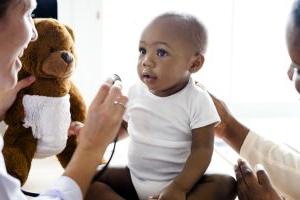RSV in Infants and Young Children

Respiratory Syncytial Virus (RSV) is an airborne virus that causes infection affecting the respiratory tract. It is most severe in infants and the elderly, and the most common cause of bronchiolitis and pneumonia in kids under one year of age. Premature infants, infants under the age of six months, children under the age of two with chronic lung disease or congenital heart disease, children with weakened immune systems or children with neuromuscular disorders are at greatest risk of severe disease. Severe disease can include apnea, or pauses in breathing for at least ten seconds, especially in kids under two months of age.
During RSV season, one-to-two percent of infants under six months require hospitalization. Treatment is all supportive as there is no good treatment for the virus itself. There is also no current vaccine to prevent it, though a medicine called Synagis, or palivizumab, can be given to very premature infants and infants with certain heart and lung conditions in a monthly shot during RSV season to try to help protect them.
Early Symptoms of RSV
RSV may not be severe when it first begins. Early symptoms of RSV may include:
- Runny nose
- Decrease in appetite
- Cough
RSV Symptoms in Infants (under six months)
In infants under six months old, the following symptoms may occur:
- Irritability
- Decreased activity
- Decreased appetite
- Apnea (pause in breathing)
Best Prevention of RSV
You should take extra care to keep your infant healthy by doing the following:
- Wash your hands often and keep your hands off of your face.
- Avoid close contact with sick people, even if they just seem to have a mild cold.
- Cover your coughs and sneezes with a tissue that you can throw away immediately or use your upper shirt sleeve.
- Stay home if you are sick.
- Clean and disinfect surfaces and objects that are frequently touched.
